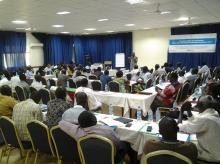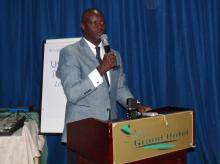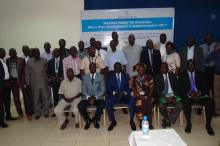WHO and partners scaling up measles vaccination to reach 2.3 million children in South Sudan
18 January 2017, Juba, South Sudan – WHO South Sudan in partnership with the MoH, UNICEF and other partners including state directors general for health and Expanded Program on Immunization (EPI) officers of all states, gathered from 17 to 21 January 2017 at Juba Grand Hotel to plan on how to reach 2.3 million persons with measles vaccines in the face of a difficult operating environment.
The experts planned and discussed training of lower levels on micro plan development at Payam (village) level; implementation of measles follow up campaign in all counties; how to enhance the skills of the key personnel in the areas of advocacy, communication and social mobilisation for the campaign; managing the cold chain system including vaccine storage and ice packs distribution; strategies for implementation in high health risk/security compromised areas; strategies for increasing the capacities of the personnel involved on other important aspects of the campaign namely: monitoring and supervision, data management, managing clients with adverse events following immunization (AEFIs) and timely reporting AEFIs during the campaign as well as waste management .
Dr Makur M. Kariom, the Undersecretary at the Ministry of Health acknowledged WHO and partners’ role in organizing the planning of the campaign and urged participants to stay focused and determined in order to achieve a 95% coverage.
Over 80 persons from different agencies and state ministries will coordinate the planning as well as monitor and supervise the measles follow up campaign at all levels. They will ensure the development of county and payam level micro plans prior to commencing the nation-wide measles follow up campaign in March 2017. The campaign will target about 2.3 million children aged six months to 59 months with measles vaccine.
Over the past decades, childhood immunization programs have substantially reduced measles morbidity and mortality at a global level. However, measles is still one of the major causes of mortality in South Sudan, says Dr Ongom Moses, WHO Officer in Charge. “We must scale up vaccination coverage to reduce measles incidence” he said.
This immunization campaign is in line with WHO AFRO Elimination Goal to be reach by 2020. The Measles & Rubella Initiative, supported by WHO and UNICEF, has been mobilizing resources and strengthening partnerships for Measles and Rubella elimination globally. To make this campaign a success in South Sudan, WHO, UNICEF and global immunization partners plan to pool technical, logistical and financial support to all the states for supplies, social mobilization and advocacy materials, training and capacity building.
This support will include providing vaccines, refrigerators, cold chain, installation of cold chain and refrigerators in every health facilities in all the counties and payams, training for health care workers, social mobilization and the launch of a multi media campaign. This will greatly enhance the capacity of the Government of South Sudan to implement the routine immunization program scheduled, reducing preventable sickness and help build a strong healthy nation for the future.
_______________________________________________
For more information, please contact:
Dr Sylvester Maleghemi, +211 956 779 467, maleghemis [at] who.int (maleghemis[at]who[dot]int)
Mr Anson Benjamin Edu, +211 955335572, edua [at] who.int (edua[at]who[dot]int)
Ms Jemila M. Ebrahim, +211 950 450 007, ebrahimj [at] who.int (ebrahimj[at]who[dot]int)
Below:
01 Mr Anson Benjamin Edu briefing the participants on campaign implementation approach
02 Dr Moses Ongom making an opening remark
03 Participants posing for a group photo






